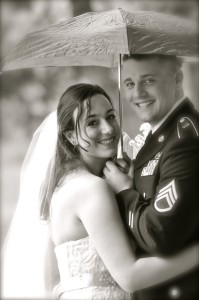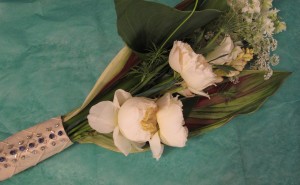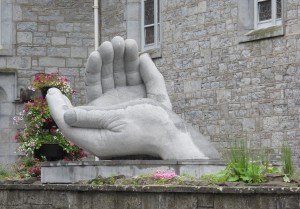Our daughter grew up as a Preacher’s Kid Squared, so she heard her father and me talk more than once at the dinner table about weddings and marriages, and from a very young age she heard us discuss the kinds of questions we asked the couples who came for pre-marital counseling: questions about values, about family patterns, about the couple’s expectations of each other (and of themselves), about finances, about plans for children (or not), about conflict.
 So it should not have been a surprise that when she and her husband-to-be decided to get married, the first thing they announced was that they wanted to pay for the wedding themselves because it was their first public, formal opportunity as adults not only to manifest their love for one another, but to show family and friends (who were flying in from around the world) what they value most highly…which starts with the people in their lives and moves outward in large, embracing circles from there.
So it should not have been a surprise that when she and her husband-to-be decided to get married, the first thing they announced was that they wanted to pay for the wedding themselves because it was their first public, formal opportunity as adults not only to manifest their love for one another, but to show family and friends (who were flying in from around the world) what they value most highly…which starts with the people in their lives and moves outward in large, embracing circles from there.
To say that their wedding day was one of the most grace-filled learning experiences (and one of the best days) of my entire life is to understate the reality.
Our daughter and (at the time) future son-in-law chose to love all of us by loving themselves and each other. They did not expect their guests to fulfill some fantasy they had of what their wedding would be. Nor did they allow themselves to be puppets in our fantasies. Our daughter asked each of her attendants to buy a blue dress that they would wear again in a style they liked – she didn’t specify the shade of blue, the length, the fabric, or the neckline. She wanted them to be comfortable and feel beautiful – and they were.
She asked me to provide the flowers as my wedding gift to them because she loves my flower arrangements and she wanted me to shine. She didn’t care what they looked like, what color they were, or what flowers I used: what she wanted was to carry a bouquet I had made. And she did. Every aspect of the day was like that: an opportunity for each of us present to shine in the radiance of their delight.
 As it turns out, one of the attendants at their wedding is getting married next fall to the man she has been in love with since their senior year of college. Ellen [not her real name] comes from a traditional family where her parents have been waiting for this day for years and already have all sorts of plans into which Ellen and Ben [not his real name either] are expected to fit. As a result, Ellen is feeling stressed and miserable under the strain of her mother’s dreams, the type of ceremony her mother wants, the list of people her mother intends to invite, and her mother’s worry about how she is going to look to these people if the wedding is not perfect, and….
As it turns out, one of the attendants at their wedding is getting married next fall to the man she has been in love with since their senior year of college. Ellen [not her real name] comes from a traditional family where her parents have been waiting for this day for years and already have all sorts of plans into which Ellen and Ben [not his real name either] are expected to fit. As a result, Ellen is feeling stressed and miserable under the strain of her mother’s dreams, the type of ceremony her mother wants, the list of people her mother intends to invite, and her mother’s worry about how she is going to look to these people if the wedding is not perfect, and….
And I am sitting here wondering why so many of us — with the best intentions in the world — fall into this trap. It isn’t just weddings; it’s careers, and colleges (or not), and religious affiliation (or not), and political stance, and material possessions, and whether to have children (or not), and the cars we drive, and the houses we live in, and how we observe holidays (or don’t).
I am wondering why we believe that loving someone means trying to turn them into a “mini-me”? Why we want the world to look like a big reflection of ourselves in a mirror? I am wondering why it is so hard to rejoice in each other’s uniqueness? Is it, perhaps, because we don’t trust our own uniqueness? Is it, perhaps, because we aren’t sure that we (personally) are lovable?
I get that being unique is risky business. There’s no crowd to disappear into. No allies who look just like us to affirm that what we are doing, thinking, being, saying, is acceptable. Being a one-off in a world that depends on everyone being able to fit in the same sized box is way too vulnerable. But if we stop trying to ‘fit’ and stop trying to make each other ‘fit’ for just a minute and look around, we will notice that — in fact — the universe keeps producing totally unique creatures and that there are amazingly huge variations within species (including, as it turns out, human beings.)
We are entering the season of harvest so biodiversity is on my mind. We have learned that a wider range of crops is better, safer, richer, for the world at large. Having 25 species of apples rather than two is insurance against things like climate change or flooding or drought. Different species survive (and thrive) in different conditions. What makes it so hard for us to apply that to our own species?
What if we stopped expending all our energy trying to turn ourselves (and each other) into clones and trusted that the universe might be onto something by making us each unique? What if Ellen’s mother let Ellen and Ben plan their wedding? What if more people said, “Buy a dress that makes you feel beautiful — it will be perfect?” Or “Choose the most beautiful flowers at the wholesaler — they will be just what I want?”
My faith tells me that we are not created in each other’s image, but in G-d’s image. Which is a way of saying we are so much bigger and more surprising than we will ever know. Maybe we should trust that. And love it.
Maybe we could all receive the wonderful gift I was given by my daughter and son-in-law on their wedding day and risk saying to one another: I want you to be comfortable and to look beautiful. I want you to shine because that makes me happy. I want you to succeed because that benefits all of us. I want you to feel cherished because that makes you happy. I want you to be all the way You because you are surprising and amazing and your uniqueness makes the world a more wonderful and whimsical place.
It’s so simple when you think about it. I wonder what makes it so hard?
–Andrea
Text © 2014, Andrea La Sonde Anastos
Photo of Ennis Hands © 2011, Immram Chara, LLC
NOTE: August 1 was the beginning of Lughnasadh (the autumn quarter). New art and cards are up on the website (here) and in the Archives (here) and in my Etsy shop. Come see!
